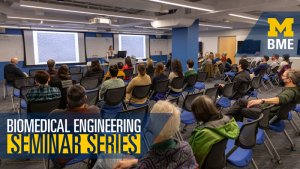Presented By: Biomedical Engineering
Biomedical Engineering Seminar Series
Location, location, location - Affinity targeting of biotherapeutics to the brain, bone, blood, and lung, with Colin Greineder, M.D., Ph.D.

Abstract:
Therapeutic monoclonal antibodies and their derivatives have become the fastest growing drug class and are often thought of as the ideal means of testing the translational significance of newly identified disease mediators. Nonetheless, there are significant barriers to their distribution throughout the body and consequences of relying on non-specific mechanisms of organ uptake. In this talk, I will discuss how affinity can be used to control the accumulation and retention of antibodies and other biotherapeutics at intended sites of action, improving both therapeutic efficacy and translational prospects. Specific examples will include delivery to brain, bone, blood cells, and lung.
Bio:
Dr. Greineder is a practicing emergency physician who earned his MD at the Yale School of Medicine and PhD at the University of Pennsylvania. He did post-doctoral training at the Institute for Translational Medicine and Therapeutics and then moved to the University of Michigan in 2018 to join the Departments of Emergency Medicine and Pharmacology. His lab is part of the BioInterfaces Institute and, largely through collaboration with engineers, pharmaceutical scientists, and disease experts, has developed a number of patented technologies around biotherapeutic delivery.
Therapeutic monoclonal antibodies and their derivatives have become the fastest growing drug class and are often thought of as the ideal means of testing the translational significance of newly identified disease mediators. Nonetheless, there are significant barriers to their distribution throughout the body and consequences of relying on non-specific mechanisms of organ uptake. In this talk, I will discuss how affinity can be used to control the accumulation and retention of antibodies and other biotherapeutics at intended sites of action, improving both therapeutic efficacy and translational prospects. Specific examples will include delivery to brain, bone, blood cells, and lung.
Bio:
Dr. Greineder is a practicing emergency physician who earned his MD at the Yale School of Medicine and PhD at the University of Pennsylvania. He did post-doctoral training at the Institute for Translational Medicine and Therapeutics and then moved to the University of Michigan in 2018 to join the Departments of Emergency Medicine and Pharmacology. His lab is part of the BioInterfaces Institute and, largely through collaboration with engineers, pharmaceutical scientists, and disease experts, has developed a number of patented technologies around biotherapeutic delivery.